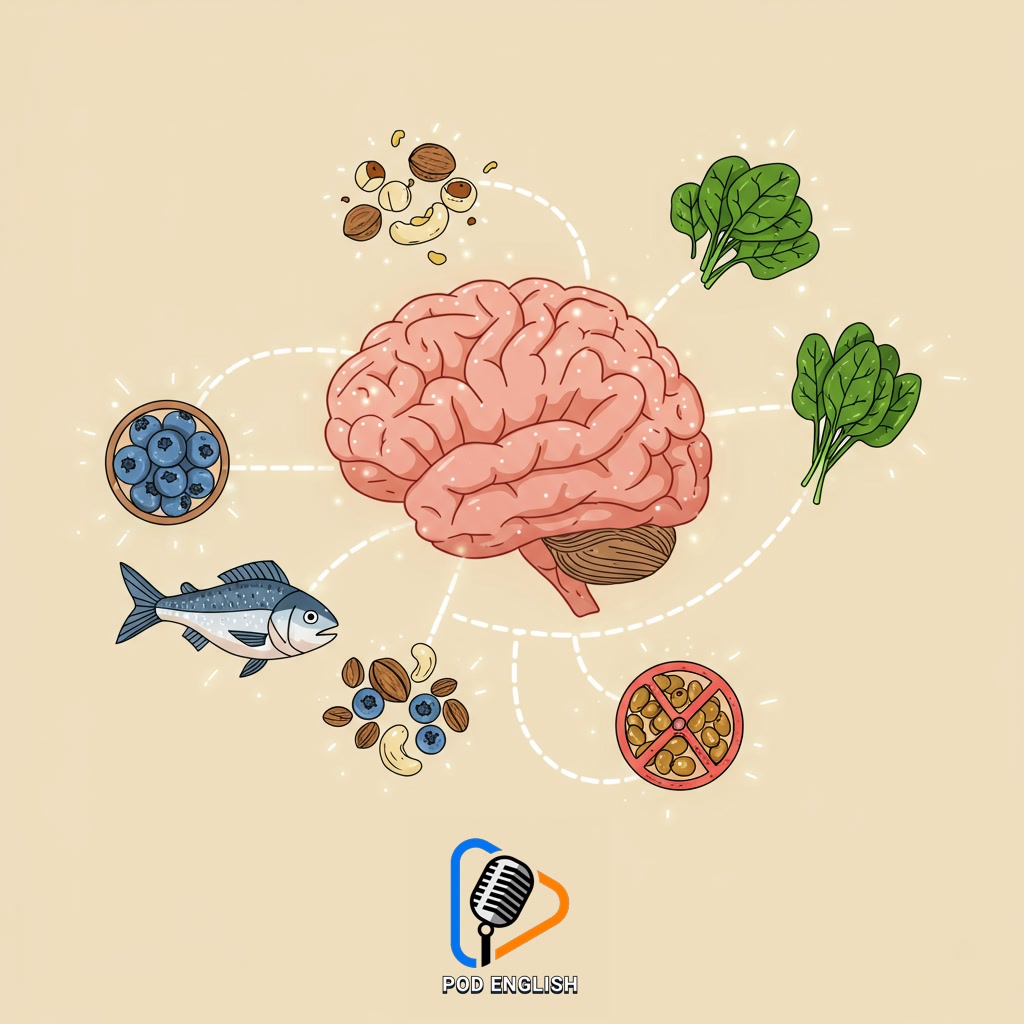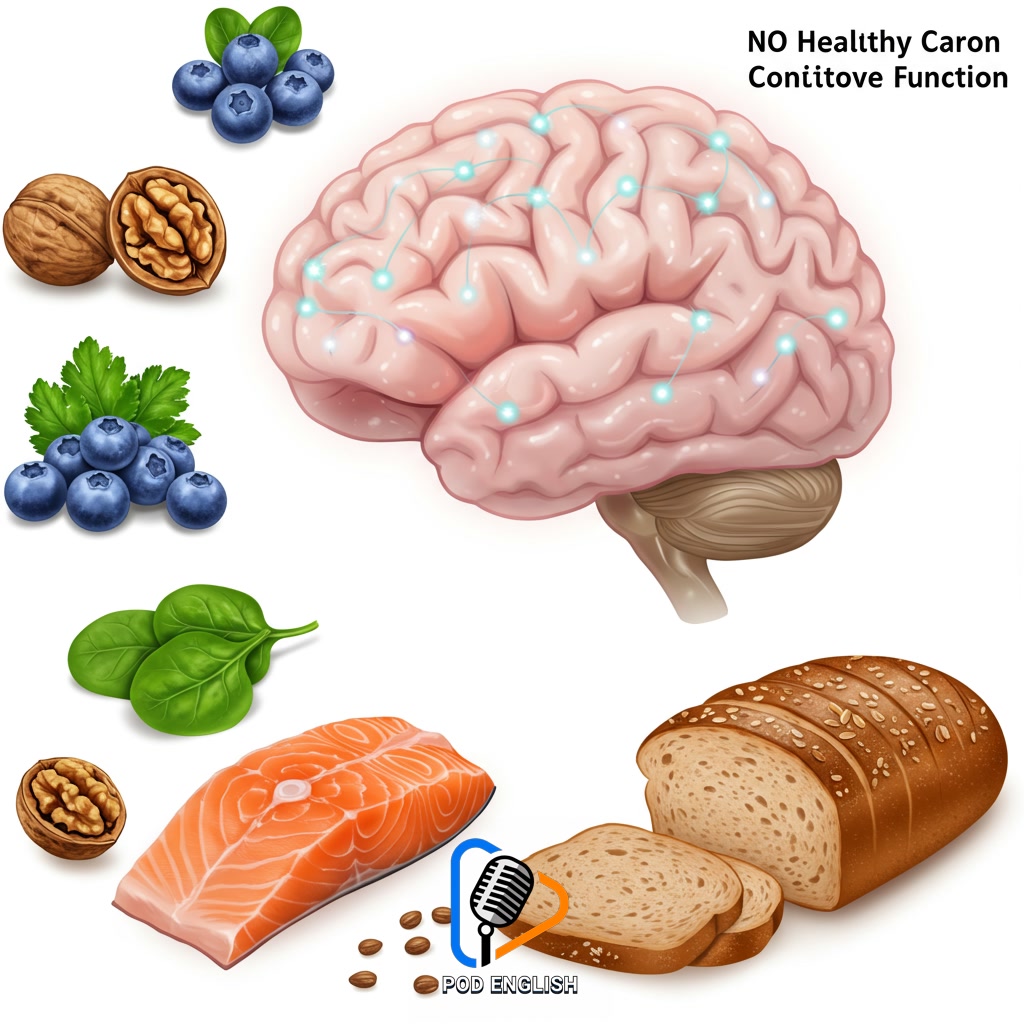Learn English
Eat Right For Exam Success And English Learning

Eating right significantly impacts cognitive function, which is essential for academic performance. Proper nutrition can enhance focus, memory, and energy levels, crucial for achieving exam success. This connection between diet and brain health is particularly beneficial when dedicating time to learning English or any new skill. Therefore, prioritizing healthy eating habits is a key strategy to support your studies and learning goals.
Table of Contents
- Section 1: Introduction: The Critical Link Between Diet, Exams, and Learning
- Section 2: The Science of Brain Food: How Nutrition Impacts Cognitive Function
- Section 3: Essential Nutrients for Focus, Memory, and Learning
- Section 4: Strategic Eating for Exam Preparation and Performance
- Section 5: Fueling Your Language Acquisition: Nutrition for Learning English
- Section 6: Practical Meal Planning and Snacking Tips for Students
- Section 7: Conclusion: Making Healthy Eating a Part of Your Study Success
Section 1: Introduction: The Critical Link Between Diet, Exams, and Learning
The connection between what you eat and how well your brain functions is more critical than you might think, especially when facing the demands of exams and learning new skills like English. Your brain, the engine of learning, requires specific nutrients to perform at its best. Just as a car needs the right fuel, your brain needs proper nutrition to maintain focus, sharpen memory, and provide sustained energy levels. This section introduces the fundamental link: understanding that diet isn’t just about physical well-being, but a powerful tool to enhance your cognitive abilities. By making conscious food choices, you can directly support your ability to concentrate during study sessions, recall information during tests, and tackle the complexities of language learning effectively.

Section 2: The Science of Brain Food: How Nutrition Impacts Cognitive Function
Your brain, like any high-performance engine, requires specific fuel to operate optimally. This section explores the scientific basis behind what is often called “brain food.” Essential nutrients play a critical role in brain structure, function, and communication between neurons. For instance, omega-3 fatty acids are vital components of brain cell membranes, while antioxidants from fruits and vegetables protect these cells from damage. Complex carbohydrates provide the steady glucose supply needed for sustained mental energy, avoiding the peaks and crashes associated with simple sugars. Vitamins and minerals act as cofactors in numerous biochemical processes essential for neurotransmitter synthesis and overall neural health. By providing your brain with these key nutrients, you support improved blood flow, enhanced synaptic plasticity, and increased production of chemicals that regulate mood, focus, and memory. This direct impact on cognitive function is fundamental for effective studying, concentration during exams, and efficient learning of new skills like mastering English.

Section 3: Essential Nutrients for Focus, Memory, and Learning
Essential nutrients play a critical role in fueling your brain for optimal performance. For focus, memory, and learning, key players include Omega-3 fatty acids, found abundantly in fish and nuts, which are vital building blocks for brain cells and support communication between them. B vitamins, present in whole grains, leafy greens, and eggs, are essential for energy production and the synthesis of neurotransmitters that regulate mood and concentration. Antioxidants from colorful fruits and vegetables help protect brain cells from damage, preserving cognitive function. Furthermore, complex carbohydrates provide a steady release of glucose, the brain’s primary energy source, preventing energy crashes that can hinder concentration during study sessions, especially when tackling challenging subjects like English grammar or vocabulary.

Section 4: Strategic Eating for Exam Preparation and Performance
Building on the foundation of essential nutrients, strategic eating involves *when* and *what* you eat to optimize your brain function during intense study periods and exams. Instead of relying on quick fixes like sugary snacks or excessive caffeine that lead to energy crashes, focus on sustained energy. This means consuming balanced meals and healthy snacks at regular intervals. Prior to studying or an exam, opt for complex carbohydrates combined with protein and healthy fats – think whole-grain toast with avocado and egg, or yogurt with berries and nuts. During long study sessions or breaks, grab fruit, a handful of nuts, or stay hydrated with water, avoiding sugary drinks. This consistent, thoughtful approach helps maintain focus, improves memory consolidation vital for language learning like English, and prevents fatigue, giving you the best chance for success.

Section 5: Fueling Your Language Acquisition: Nutrition for Learning English
Just as strategic eating optimizes brain function for general study, it specifically enhances your ability to acquire a new language like English. Learning English demands sharp focus for understanding nuances, strong memory for vocabulary and grammar rules, and sustained energy for consistent practice. Fueling your brain with nutrient-rich foods provides the vital support needed for these tasks. Complex carbohydrates offer steady energy for long study sessions, while healthy fats and proteins support cognitive function and memory retention crucial for remembering new words and phrases. Staying hydrated is also key for maintaining concentration during listening or speaking practice. By making mindful food choices, you are directly investing in your brain’s capacity to absorb, process, and retain new linguistic information, making your English learning journey more effective and enjoyable.

Section 6: Practical Meal Planning and Snacking Tips for Students
Building on the understanding that nutrition fuels your brain, let’s get practical about how to eat for optimal study and English learning. Effective meal planning is key. Aim for regular meals throughout the day, avoiding long gaps that can lead to energy crashes and difficulty concentrating. Include a balance of complex carbohydrates (like whole grains), lean protein, and healthy fats in your main meals to sustain energy and focus. Don’t skip breakfast, as it provides essential fuel after a night’s rest. For snacks, choose options that offer a steady release of energy and nutrients, rather than sugary fixes that cause spikes and crashes. Planning these meals and snacks in advance can save time and prevent impulsive, unhealthy choices when you’re busy studying.

Section 7: Conclusion: Making Healthy Eating a Part of Your Study Success
In conclusion, integrating mindful eating into your daily routine is a powerful strategy for enhancing both exam performance and English learning. As we’ve explored, nourishing your body with balanced meals and healthy snacks directly fuels your brain, improving focus, memory retention, and sustained energy levels. Making these dietary choices isn’t just about physical well-being; it’s an active investment in your cognitive health and academic success. By prioritizing nutrient-rich foods, staying hydrated, and planning your meals, you are actively supporting your brain’s capacity to absorb information, tackle complex problems, and effectively practice new skills like English. Embrace healthy eating as a fundamental component of your study toolkit, and unlock your full learning potential.














